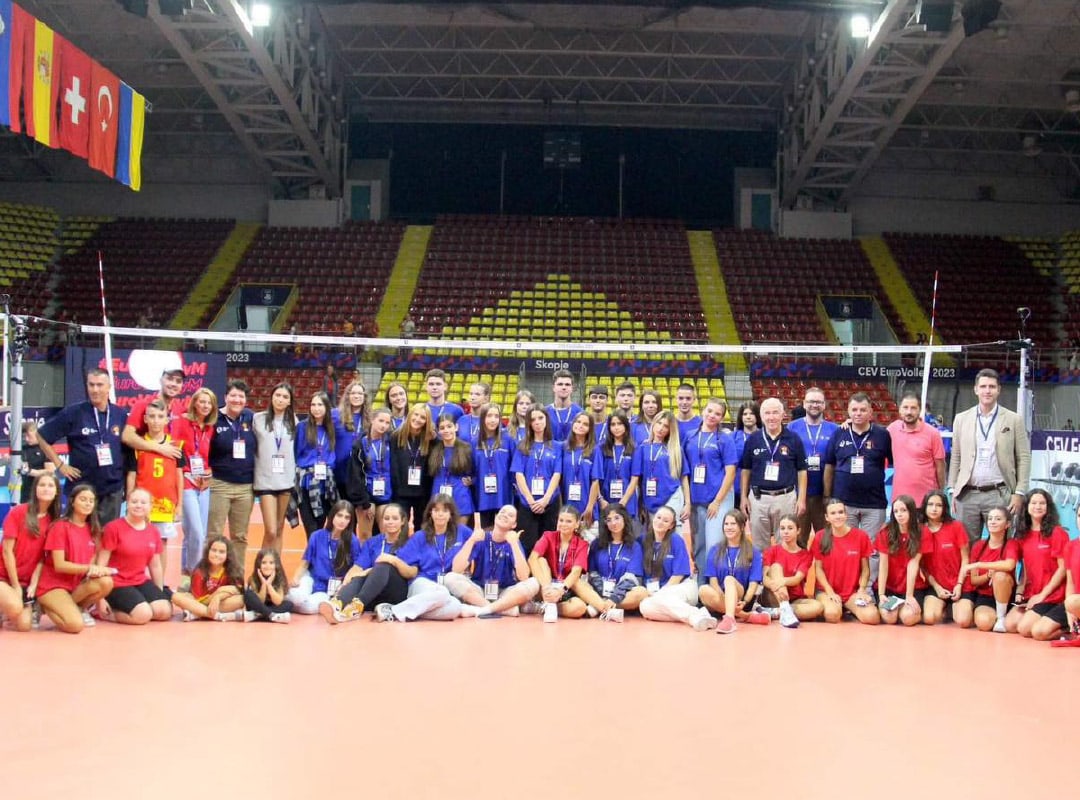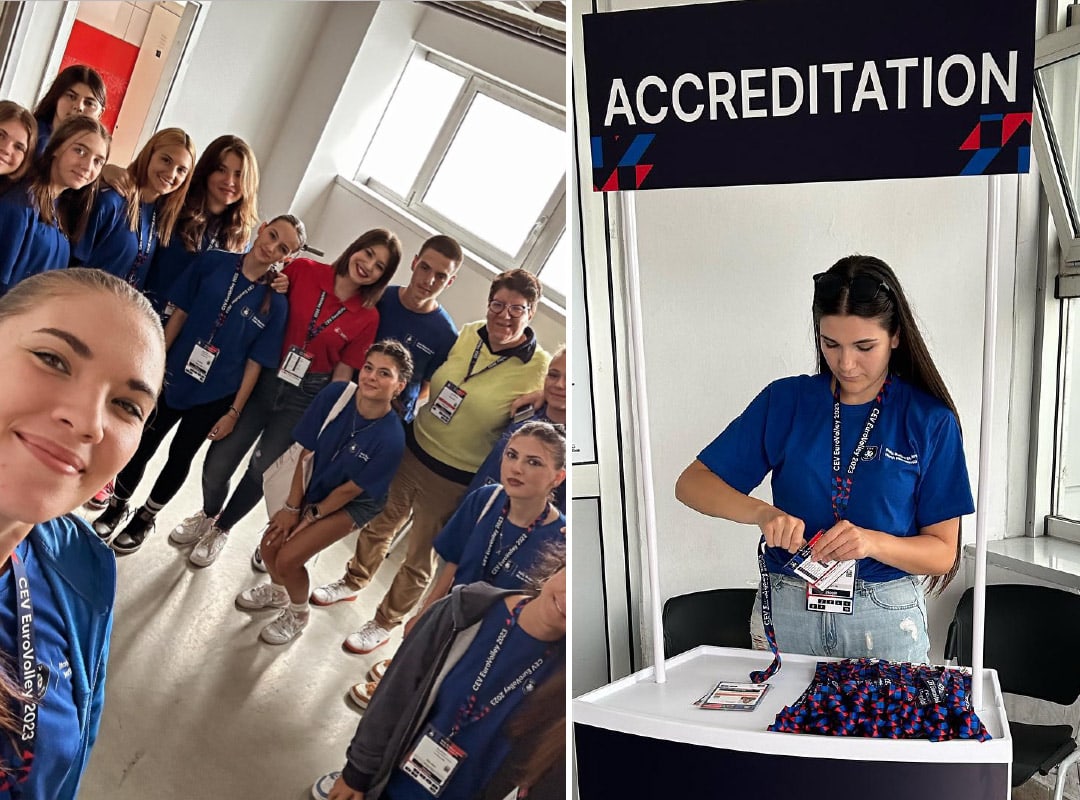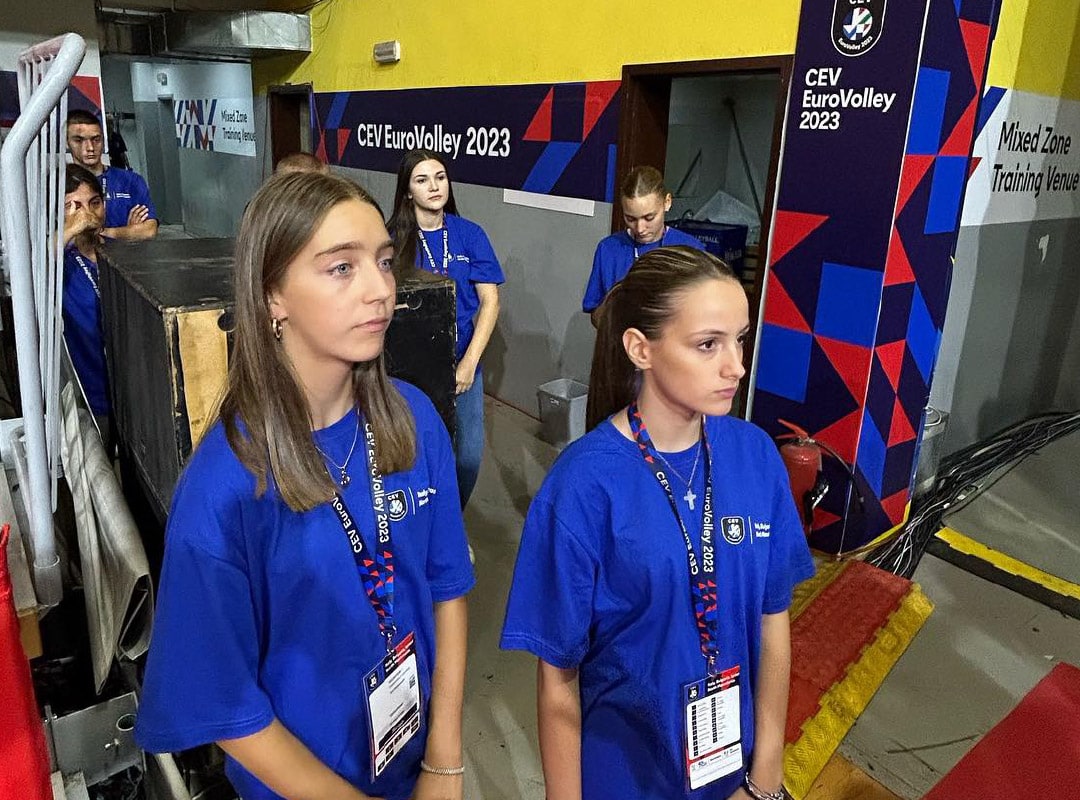V4V Good Practice Case Studies: NR Sports Volunteering Solutions
Sport / Activity: Consulting / Volleyball | Country: Macedonia

Which of the four pillars does the example cover?
Pillar 1 – Volunteer strategy and planning
Pillar 3 – Volunteer management and retention
Pillar 4 – Volunteer development and training
Focus of volunteer intervention: CEV EuroVolley Skopje 2023

Objective(s):
The CEV EuroVolley 2023 Men’s competition was based across four host countries: North Macedonia, Bulgaria, Israel, and Italy. Skopje in North Macedonia hosted one of the group stages of the completion during August and September 2023. 50 volunteers were recruited, trained, allocated, retained for the needs of the Championship, working across 11 different operational departments (accreditation, team management, guest management, volunteer office, VIP protocol, doping control, technical support, match-day-hall operations, marketing activities, media centre, and fan engagement).
A key challenge facing the delivery of the group stage in Macedonia was the lack of a volunteer culture within the country, and an even less-developed sport volunteering culture. The volunteer intervention lead by NR Sports Volunteering Solutions working alongside the National Volleyball Federation of Macedonia aimed to overcome this challenge to recruit and train volunteers for the CEV EuroVolley 2023 event. Furthermore, the intervention also aimed to transfer essential knowledge to the Federation to enable them to sustain and further develop volunteering in the future.
Activities undertaken:
Several actions were undertaken to successfully deliver the intervention:
1. Development of Volunteer Management Strategic and Operational Plan involving establishing the main goals and values for the programme and devising strategies for volunteer recruitment. This also including planning for legacy creation and post-event knowledge transfer.
2. Delivery of a structured volunteer training programme for all volunteers
3. Volunteer Management Phase including:
a. A ‘recruitment’ phase focused on attracting 50 volunteers aged 14-20 years of age. This involved collaborations with a university and its sport management department to identify potential student volunteers, recruitment drives in volleyball clubs, and the launching of a public call on the event website.
b. The production of a Volunteer Guide including job/role descriptions, schedules, and skill requirements for each volunteer position.
c. The creation of a Volunteer Application form which was made available through various channels, including social media and the university’s website.
d. The establishment of a Volunteer Code of Conduct outlining appropriate behaviours and communication strategies
e. Delivery of training sessions including an orientation at the event venue.
4. Overseeing and managing volunteer operations during the event
5. Knowledge Transfer and Legacy:
a. Handing over the event management tools to the Macedonian Volleyball Federation for future volunteer organisation.
b. Establishing and maintaining an active Volunteer Hub for subsequent events.
c. Passing on key contacts established through the intervention with National Sports Federations, Universities, High Schools, and sports clubs. This also included contacts generated for potential partnerships with local businesses to support the volunteer programme in the long-term.
Challenges faced:
There were several challenges facing the successful implementation of the intervention. The lack of an established volunteer culture in Macedonia meant that ‘selling’ the idea of volunteering, and motivating individuals to volunteer was difficult. Secondly, recruitment for the event fell during the long school and university summer break making it difficult to find and recruit students and athletes as volunteers. Thirdly, Macedonia’s sports event landscape does not frequently organise events that require a high number of volunteers therefore maintaining the Volunteer Hub may be difficult due to a lack of opportunity to volunteer at sports events. Finally, the professional management of volunteers is not yet fully recognised or valued as it should be highlighting the need for a strategic approach to preserve the volunteer workforce and enhance the appreciation and management of volunteer contributions in the sports sector.
Impact:
The volunteering intervention has directly contributed to cultivating a local culture of volunteerism. It has heightened the interest of younger generations in sports volunteering by showcasing the tangible benefits of such involvement. It has also created a lasting legacy of volunteers dedicated to the National Volleyball Federation, the sport of volleyball, and the wider community.
The intervention also facilitated greater collaboration among national sports federations, particularly in the exchange of volunteers. Moreover, it has strengthened ties and collaborative opportunities with the already-established Athletic Federation. As a result, a central volunteer hub has emerged from this initiative, providing the National Volleyball Federation with a ready and competent volunteer force for upcoming national and international events.
Partnerships with the business sector developed via the intervention continue to provide support to the volunteer programme, and have created the potential for future partnerships and business cooperation for future volleyball events in the country.
The volunteers involved in the event were supported to develop skills such as effective communication and teamwork that can be used in future endeavours. They also made new friends and gained societal recognition with volunteering viewed as a beneficial and innovative way for young people to spend their summer holidays. This acknowledgment underscores the value of volunteering in personal development and community engagement.

